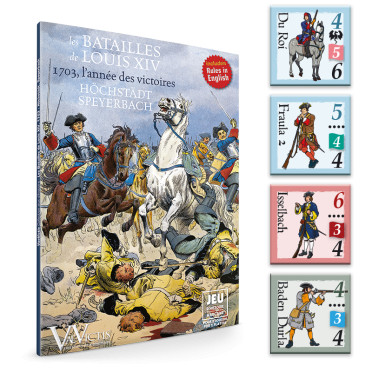In September 1703, the Franco-Bavarian army of the Danube clashes with two enemy armies.
One is under the command of Count Styrum and the other of the Margrave of Baden. On 17 September, Villars is informed that Styrum’s army is marching on Höchstädt, ready to establish a bridge at Grenheim to launch a combined attack against the French Army at Nodendorf on the other bank of the Danube.
Ordering the army to march due north, Villars asks d’Usson’s corps of 7000 men stationed at Dillingen to be ready at Höchstädt on the morning of the 20th. In the early morning hours of the 20th the Franco-Bavarian army crosses the Danube at Donauwörth, and then marches toward the Austrian army.
The vanguard meets Prussian troops who return to Styrum. Styrum decides to move out toward the north and better defensive positions. The train begins its movement toward Nördlingen. Due to a quiproquo, d’Usson is supposed to attack the Austro-Prussian army from the other side and launches his attack around 08.00. The Austrians are sure this is the principal offensive and change their plan and march on Oberglauheim. One against three, the French troops hold out while Villars is only three hours away by foot…
In October 1703, Marshal Tallard besieges Landau to recapture it from imperial hands. Marlborough’s allied army of Flanders sends a corps commanded by the Prince of Hessen-Kassel to lend assistance to the troops of the Count of Nassau-Weilburg.
On 13 November, the latter’s troops cross the Rhine and join forces with the Prince. The troops camp between Heilingenstein and Dudenhofen in front of Spire (Speyer). The attack against the French forces besieging Landau is planned for the 16th.
Tallard has requested Pracontal’s help since the 10th. The latter being in Lorraine, the Imperials are sure that he will never arrive in time.
On the evening of the 14th, Tallard leaves Landau, and 6000 men, and marches toward Spires.
In the morning of the 15th, he reaches Pracontal at the appointed time and, now with 18 000 men, prepares to face off against 20 000 men from the imperial army.
At 13.00 the French Army in battle order engages the combat against the enemy’s left wing which is only barely deployed and is disorganised!
The game proposes two scenarios for each of the battles.
The game includes :
- Two 59 x 41 cm maps (printed double-sided)
- 216 double-sided, pre-cut counters and markers
- A book of rules and scenarios (both in French and in English)
- One colour player aid
Copyright © 2025 www.philibertnet.com Legals - Privacy Policy - Cookie Preferences - Sitemap






